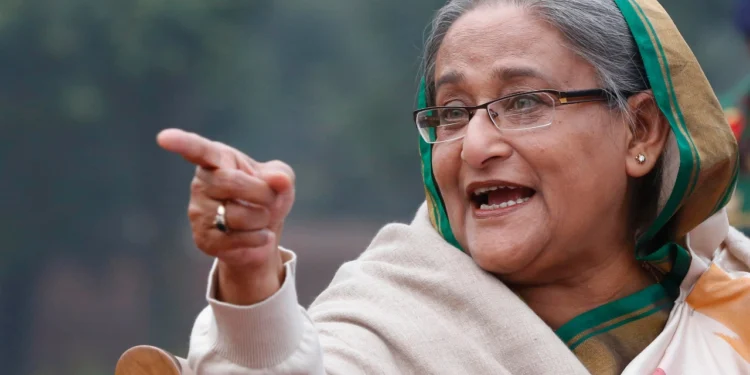Sheikh Hasina was 23 years old when Bangladesh was born—out of the India-Pakistan war, in 1971. Four years later, her father—and that of the nation, Sheikh Mujibur Rahman—was murdered following a military coup. Rahman, the leader of Mukti Bahini (Liberation Army), who had presided over the liberation of Bangladesh from Pakistan with the help of India under the leadership of late Prime Minister Indira Gandhi, was also the country’s first president. He was done to death along with his family during a military coup in 1975. Hasina and her younger sister survived only because they were abroad at the time.
During 53 years since the formation of Bangladesh, Hasina was prime minister for full four terms—from 1996 to 2001, then from 2009 to now, having been elected for the fourth consecutive term in January this year. She survived many assassination attempts, one in 2004, in which grenades were thrown at a political rally she was addressing. She got away with a damaged hearing, 20 people were killed and 500 were injured in that attack.
Hasina has paid a price for her strong opposition to the fundamentalist Islamist forces that are now running riot in the streets of Bangladesh, beating policemen to death, and torching and looting Hindu homes and businesses. There are no confirmed reports about the number of people killed, but going by the mobs running amok in the streets, the scene is dreadful.
It is the student wing of Jamaat-e-Islami (JI), Islami Chhatra Shibir (ICS), which organised violent mass protests in Bangladesh last month, overtly, against the job reservations system. The protests culminated in Hasina’s ouster from office and country. That Hasina sought and got quick help from India is no surprise. She had received the same care and protection from India after her father’s assassination in 1975. She returned to Bangladesh only in 1981. The fundamentalists’ ire against her is based as much on her strong sentimental affinity with India as on her opposition to their aggressive and persistent attempts to turn Bangladesh into an Islamic state.
It is only thanks to Hasina that Bangladesh, at least officially, remains a secular democracy. That Islamic terrorism has taken a huge toll in Bangladesh remains an untold story: the Hindu population that was close to 30 percent in 1947, stands reduced to less than seven percent today. The political scenario in Bangladesh is downright scary for its minorities, especially Hindus, because of the frequent attacks engineered by the Islamic terrorists.
Hasina’s personal and political journey has been inextricably linked to her country’s history. Her ascendancy to the country’s top political position as the head of Awami League party tells an extraordinary story about her. Her life deserves a better climax than a forced ouster from her office and country–and homelessness. Although India may again give her political asylum, it is nothing short of a tragedy for her.
Luckily for her, she was allowed to leave the country in a military chopper before the chief of army staff, Waker-uz-Zaman, announced the take over. Left to the fundamentalist student mobs, who have been baying for her blood, the climax would have been horrific.
Hasina’s son Sajeeb Wazed Joy, who was her official advisor on technology and communications until her resignation on Monday, has already announced her retirement from active politics. Bangladesh is in the hands of the military going by the announcement of the army chief, but it is virtually being run by mobs.
The sad climax of Hasina’s life and political career tells a parallel story of Bangladesh politics. Hasina’s long and impressive political career is a study in complexity. To describe her as a democracy icon-turned-autocrat, as some critics are doing, would be naive. It is difficult to imagine Bangladesh as a democracy but for Hasina’s leadership. She did not stray from her secular ideology despite the pressures she faced from the fundamentalists.
Although Dhaka has had close ties with the Arab world, the country’s political sentiments are not invested in Islam and the Islamic quest for global power, and that is largely due to her leadership. Even her ally-turned-arch rival, Khaleda Zia, chief of the Bangladesh Nationalist Party (BNP), and two-term prime minister from 1991-1996 and 2001-2006, despite inheriting political leadership from her military dictator husband Zia-ur-Rahman, who was assassinated in 1981, and despite forming a government with the support of Islamic fundamentalists in 1991, was instrumental in turning Bangladesh from the presidential system into a parliamentary form of government. It is she who made primary education compulsory and free in a poverty-stricken Bangladesh.
Under Hasina’s leadership, who returned to power for the second time in 2009, 700,000 Rohingya Muslims, purged from Myanmar, were resettled in Bangladesh. The refugee camp in Cox Bazar, a town in the country’s south-east, is the world’s largest, with 600,000 people housed there. Run by the Bangladesh government, it is a testimony to Hasina’s able leadership. Again, it is Hasina who architected the bright turn around in the country’s economy.
Bangladesh is now one of the fastest-growing economies in the region, even surpassing India. Its per capita income had tripled in the decade up to 2020. Although Covid-19 hit the economy hard, the World Bank estimated that more than 25 million people had been lifted out of poverty until three years ago.
At the same time, there have been allegations against Hasina’s government of extra-judicial killings, jailing of political opponents, gagging of the Press and rampant human rights violations. Following Hasina’s ouster from power, Khaleda Zia, under house arrest since 2018, has been released; the name of Nobel laureate and strong opponent of Hasina, Mohammad Yunus, has been suggested for the post of interim prime minister by ICS, while president of Bangladesh Mohammed Shahabuddin is holding meetings with the political leaders to form an interim government.
Yunus himself seems to be endorsing the actions of ICS by claiming that the country has been liberated a second time. The opponents of Hasina are, perhaps, waiting to taste the leadership of the Pak ISI-backed ICS, before they realise the threat it poses to Bangladesh’s security and stability.
The ICS bloodhounds, lolling on the sofas of Hasina’s official residence in Dhaka and walking out with the loot after she fled the country, tell a scary story about the shape of things to come in Bangladesh.


















Discussion about this post